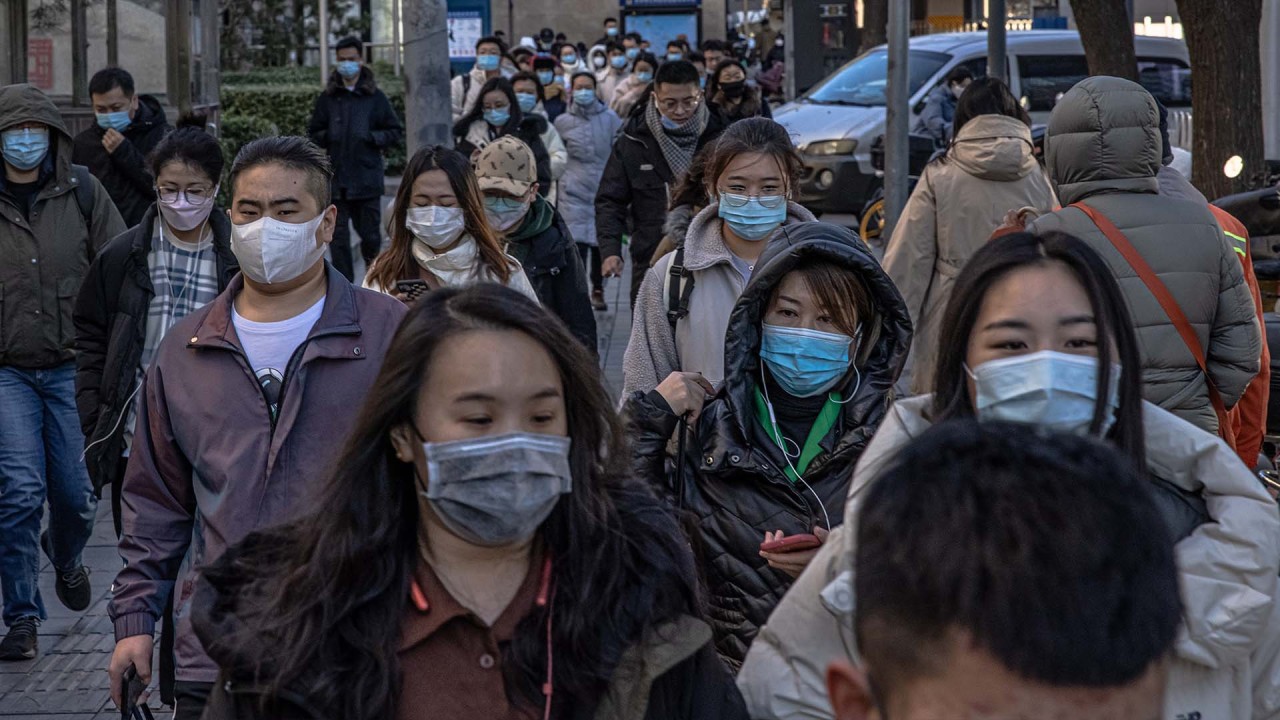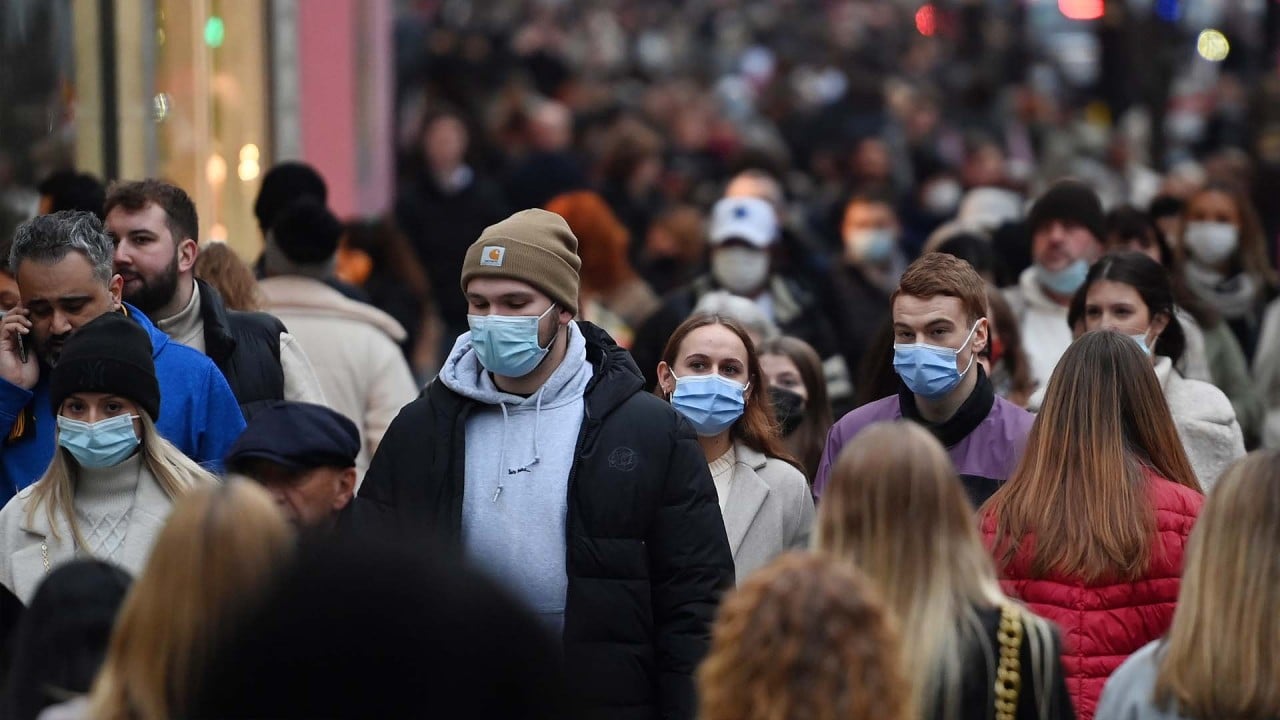Prime Minister Fumio Kishida on Tuesday said its Covid-19 border controls, some of the strictest in the world, would remain in place for the time being.
Japan has had 1.73 million coronavirus infections and 18,391 deaths since the pandemic began, but the rate of new infections has been falling.
In South Korea, rising cases have forced authorities to announce restrictions on gatherings and operating times for restaurants, cafes and bars.
While polls show wide support for South Korea’s fresh curbs, some of its strictest yet, many small businesses have complained that restrictions leave them overstaffed and overstocked, having prepared for a holiday season under looser rules.
Small business and restaurant associations issued statements protesting the decision and calling for compensation, hundreds rallying in South Korea’s capital on Wednesday, calling for the withdrawal of restrictions.
The protesters pumped their fists in the air and chanted, “Guarantee the right to live!” and “Scrap restrictions on business operations!”
Some jeered when a lawmaker took the podium to explain aid packages proposed by the governing party presidential candidate. But no major violence or clashes with police erupted.
Under current social distancing guidelines, up to 299 people are allowed to join rallies but all must be fully vaccinated.
‘We have to just stay calm’ says Australian PM
Australian Prime Minister Scott Morrison on Wednesday ruled out a Christmas lockdown, saying hospitals were coping well with a record surge in Covid-19 cases fuelled by the Omicron variant.
Australia is grappling with the more transmissible Omicron variant of the coronavirus as restrictions ease ahead of the Christmas holidays after higher vaccination levels were reached.
“Despite these rising cases, hospitals and health systems remain in a strong position but of course they will be tested,” Morrison told reporters in Canberra after an emergency cabinet meeting.
Even as daily infections surge to record tallies, hospitalisation and death rates remain low compared with those seen during a wave of cases from the Delta wave and Morrison said there would be no more lockdowns.
“Australians have worked very hard to have this Christmas together and we want to protect that. One of the things we agreed today is, we are not going back to lockdowns. We do not want to go back to lockdowns,” Morrison said.
In an earlier television interview, Morrison pushed state and territory leaders to move ahead with reopening plans.
“The idea that you’re going to suppress it at any extreme level or you’re going to eliminate it, that’s nonsense,” Morrison said of the Omicron variant in a television interview on Wednesday. “We have to live with it and we have to just stay calm.”
Morrison insisted that limiting the spread of the virus comes down to personal responsibility. No national mandatory rule to wear masks indoors would be introduced, although it would be “strongly recommended”, he said.
However, residents of most states, except the most populous New South Wales, have been ordered by their state governments to wear masks indoors in public buildings.
After the emergency cabinet meeting, Morrison announced new vaccination funding for clinics and pharmacies. He also urged the country’s states to reopen hundreds of vaccination hubs, which were shut down when double-dose rates in adults topped 80 per cent, to accelerate a booster roll-out.
Australia on Wednesday reported more than 5,000 daily infections for the first time during the pandemic, eclipsing the previous high of about 4,600 the previous day. About 95 per cent of new cases were New South Wales and Victoria states.
The total of 265,000 infections and 2,162 deaths since the pandemic began is far lower than that of many countries.
Philippines cuts booster shot interval to three months
The Philippines’ health ministry has halved the wait time for a Covid-19 vaccine booster to three months to help prevent the spread of the more infectious Omicron variant.
A growing list of countries, including South Korea, the United Kingdom, Thailand and Germany, are shortening the interval for boosters to try to stave off a new surge in infections.
Adults can receive a booster dose at least three months after the second shot of a two-dose vaccine, cutting the six-month gap. Recipients of a single-dose vaccine can get a booster shot after two months, the health ministry said.
“We are exploring all possible options to safely mitigate the effects of more transmissible variants of Covid-19,” Health Secretary Francisco Duque said.
The Southeast Asian nation has detected three imported cases of Omicron variant. Covid-19 cases have fallen to an average of 378 a day in December from the peak of 18,579 daily in September.
The Philippines has received more than 192 million doses of Covid-19 vaccines, and fully inoculated roughly 44.2 million of its 110 million population, government data shows. In November, the government started the roll-out of booster doses for health care workers and the elderly.
Additional reporting by Associated Press
https://news.google.com/__i/rss/rd/articles/CBMid2h0dHBzOi8vd3d3LnNjbXAuY29tL25ld3MvYXNpYS9zb3V0aGVhc3QtYXNpYS9hcnRpY2xlLzMxNjA2NDgvY29yb25hdmlydXMtc2luZ2Fwb3JlLWhhbHRzLXZhY2NpbmF0ZWQtdHJhdmVsLWxhbmUtdGlja2V00gEA?oc=5
2021-12-22 09:56:59Z


Tidak ada komentar:
Posting Komentar